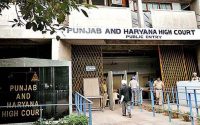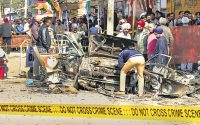$100 Website Offer
Get your personal website + domain for just $100.
Limited Time Offer!
Claim Your Website NowPunjab is losing water on the plans of Delhi to tackle pollution, farmers said – we are forced to burn stubble
Source:-https://pledgetimes.com
In Delhi-NCR these days the haze has once again sparked debate about all kinds of pollution. In the midst of the day-to-day pollution taking place in the capital and surrounding areas, the process of stubble burning in Punjab is still going on and the farmers here are busy pouring water on the Delhi government’s arrangements and plans to get rid of pollution. Huh.
In many places from Amritsar to Mohali, farmers still burn stubble in their fields. According to the news agency ANI, during this time a farmer from the village of Deep Mandi in Amritsar said that we are forced to burn Parali. Despite the High Court order, we have not been compensated by the government. We do not have 10 lakh rupees to buy machinery and tractors.
The farmer said that we also do not want to burn the straw, but the government is not helping us to deal with it. We ourselves are very much worried about Parali.
Let us tell you that the Supreme Court on Friday, one of its former judge Justice Madan B. to monitor the steps related to the prohibition on burning of stubble caused by pollution in Delhi-NCR. A member committee of Lokur has been constituted. The Lokur Committee will submit its report on the incidents of stubble burning to the Supreme Court after the holiday of Dussehra.
A three-judge bench headed by Chief Justice SA Bobde ordered that all officials of the Delhi and Environmental Pollution (Prevention and Control) Authority report to the Justice Lokur Committee.
The Supreme Court said that National Cadet Corps (NCC), Bharat Scouts and Guides and National Service Scheme (NSS) were also deployed in those areas to help the Lokur Committee to monitor incidents of stubble burning in Punjab, Haryana and Uttar Pradesh. Go These mobile teams will give notice of fire in the fields, on the basis of which officers will take action.
The Supreme Court directed the Chief Secretaries of Haryana, Punjab and Uttar Pradesh to assist the Lokur Committee in monitoring the fields in which straw is burnt. The court has asked the committee to provide all assistance and to arrange for the security of infrastructure, transport and mobile teams.
Delhi-NCR hope for relief in pollution this year
The Central Pollution Control Board (CPCB) on Friday said that there are broadly three factors of pollution in Delhi and NCR – meteorological factors, regional factors such as stubble burning and local factors. The CPCB stated that the weather conditions in Delhi are highly unfavorable for the spread of pollutants since September this year.
Chairman of CPCB Shiv Das Meena has seen a decline in pollution levels in Delhi-NCR in the last few years. Meena said that due to less area of non-basmati paddy in Punjab and Haryana, Delhi-NCR is expected to get relief in pollution this year. He said that farmers have problems in disposal of non-basmati paddy straw and they burn it in the field. In Punjab, paddy crop was on 22.91 lakh hectare last year, while this year its acreage has come down to 20.76 lakh hectare. Similarly, the area under non-basmati paddy in Haryana has been 4.27 lakh hectare this year as compared to 6.48 lakh hectare last year. This is expected to reduce the incidence of stubble burning.
It is worth mentioning that in the cold weather Delhi-NCR contributes between 4 to 40 per cent of the polluted straw in the surrounding states every year. Regarding the increase in the incidents of stubble burning so far in the months of September and October over the previous year, Mr. Meena said that this year it has happened due to early harvesting. It is expected that such incidents will reduce throughout the season.
‘Red light on, car off’ campaign started in Delhi to tackle pollution



